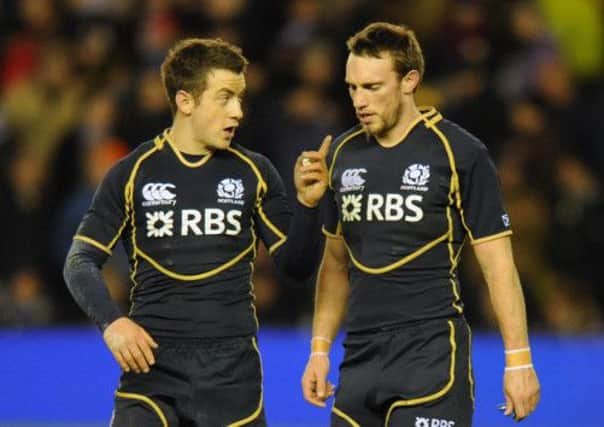Allan Massie: Some can make it without ‘bulking up’


Any revelation of doping of any sort in any sport is always followed by the airing of rumours and allegations, most of which turn out to be no more than froth and bubbles. What is clear is that there is a fine line between legitimate food-and-drink supplements, and illegal ones; and that all players, but young ones especially, should be very careful about what they take, and should always seek advice from club doctors.
There are a couple of aspects of the Sam Chalmers story that should be discussed. There is no question about what he did; he has admitted his guilt, apologised to all around him, and accepted his punishment without demur. As he says, he was stupid and naïve, buying steroids from an internet site. I think the punishment – two years’ suspension from rugby – a bit harsh. It is evidently an exemplary sentence, intended to deter others. Such sentences are always morally dubious. It is not a case of the punishment fitting the crime; the sentence is aimed at others who might be tempted to do as the culprit did.
Advertisement
Hide AdAdvertisement
Hide AdThe most worrying feature of the case is not that Sam Chalmers stepped out of line, for there will always be people, especially youngsters, who are led by ambition to do foolish things. It is rather why he did so. It seems that he had been told that he could not hope for a successful career in top-class rugby if he didn’t “bulk up”. One wonders who gave him this advice and in what terms they put it. One also wonders whether the assumption on which it is based is true.
In the first place, Sam Chalmers is not exactly a midget. At the age of 19, he stands 5ft 10in or 11in, and weighs more than 12 stone. Nevertheless, he is quite lightly built by today’s standards; look at the Welsh backs in the Lions squad. That said, one would assume that, in the normal course of events, natural development and regular gym work would enable him legitimately to build up muscle and add perhaps a stone in weight. Of course, this might not happen; there are some whose bodies don’t respond in this way. He may be one such.
Would this be a disaster? Is there no place for the more lightly-built in top-level rugby today? The evidence suggests there is. It’s unlikely that Scotland will ever field such a lightweight three-quarter line as we did when we won the Grand Slam in 1984, with players like David Johnston, Roger Baird and Keith Robertson, none of them as big or heavy as young Sam Chalmers is today. Nevertheless, Chris Paterson, Mike Blair and Greig Laidlaw have all had very successful international careers without being man-mountains. Paterson and Blair were two whose body-shape scarcely changed, no matter how hard they trained and worked in the gym. Of course, they had qualities to compensate – speed of foot and thought, a high level of skill and a keen rugby brain. Speed of thought and good judgement have enabled Laidlaw to play successfully at fly-half as well as in his natural scrum-half position. There are examples elsewhere of players who compensate for lack of size by speed and skill: Shane Williams, Leigh Halfpenny, Morgan Parra and Freddie Michalak. Sam Chalmers might be best advised to get out a pair of spiked running shoes and concentrate on working on his speed while he is banished from the rugby field. In any case, bulking up isn’t always in a player’s best interests. Some put on weight and lose speed.
Elsewhere, it’s very good to see that Alex Blair has been recalled by Edinburgh, provisionally at least. He looked to have the makings of an outstanding fly-half when he played age-group international rugby, blessed with natural speed and the alert rugby brain that enabled him to see the half-gap in defences. Then an injury which refused to clear up saw Edinburgh discard him. He returned to club rugby with Edinburgh Accies, though managing only a handful of games last season. Now a summer playing in Australia seems to have set him up, and his form with Accies has encouraged Edinburgh to look at him again. He has time to make up, but, happily, time is still on his side, and, if he can stay fit, there is no reason why he shouldn’t yet fulfil his youthful promise.
As for the pro teams, Glasgow last night ended their run of narrow defeats at the hands of what has been the best side in our league over the last couple of seasons. They showed great persistence to break Leinster down and defended as well as they did in Belfast last week. Edinburgh play the Ospreys in Wales this evening, and this is a match which few will expect them to win. If they make it close, it will represent a step up from their league form in the last couple of years, especially since they are missing their general, Laidlaw, and Matt Scott, their most accomplished midfield player.